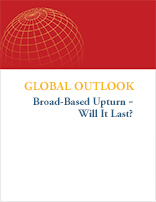
Dust storm movin' in, ominous. Perfect. Maybe add some mournful Irish harmonica:
(this is a repost from February 4, 2018)
From RT, Jan. 10
The growth of the global economy appears to have peaked, according to a new report from the World Bank. The report shows a lack of investments, a slowdown in productivity and tightening monetary policy.
Although the bank has raised its projection for global growth from 2.7 percent to 3 percent, it warned that the acceleration in growth would be temporary unless governments implemented structural reforms to raise long-term growth potential. This is in spite of the fact that it has revised estimates upwards for both 2018 and 2019.
“Focus should now turn to the structural policies needed to boost longer-term productivity and living standards,” said the report.
The World Bank’s lead economist Franziska Ohnsorge said: “It would be the slowest decade of potential growth since [the World Bank's dataset began in] the mid-nineties.” This could have serious repercussions for investors and for borrowers, she warned.
The World Bank has predicted that advanced economies (as a group) are expected to slow in the coming years as they run up against full employment and as central bankers raise rates to contain inflation. Growth in advanced economies is expected to slow from 2.3 percent last year to 2.2 percent this year and 1.7 percent by 2020. Emerging and developing economies, which grew by 4.3 percent as a group last year, are also likely to slow and contribute less to global growth.
Geopolitical tensions and an upsurge in protectionism which could stop trade growth from recovering and undermine GDP are also among the potential risks for the global economic expansion.
According to Ohnsorge, stock markets are at levels similar to those seen before the Wall Street Crash of 1929. Bond markets are assuming that low inflation will keep official borrowing costs down, she said....MOREThe World Bank isn't quite as down-in-the-dumps as the Russian headline, here's:
Global Outlook
Global growth is expected to be sustained over the next couple of years—and even accelerate somewhat in emerging market and developing economies (EMDEs) thanks to a rebound in commodity exporters. Although near-term growth could surprise on the upside, the global outlook is still subject to substantial downside risks, including the possibility of financial stress, increased protectionism, and rising geopolitical tensions. With output gaps closing or closed in many countries, supporting aggregate demand with the use of cyclical policies is becoming less of a priority. Focus should now turn to the structural policies needed to boost longer-term productivity and living standards.|
|
Link
Hell, that's damn near chipper, let's go economically up-tempo with Khachaturian:

